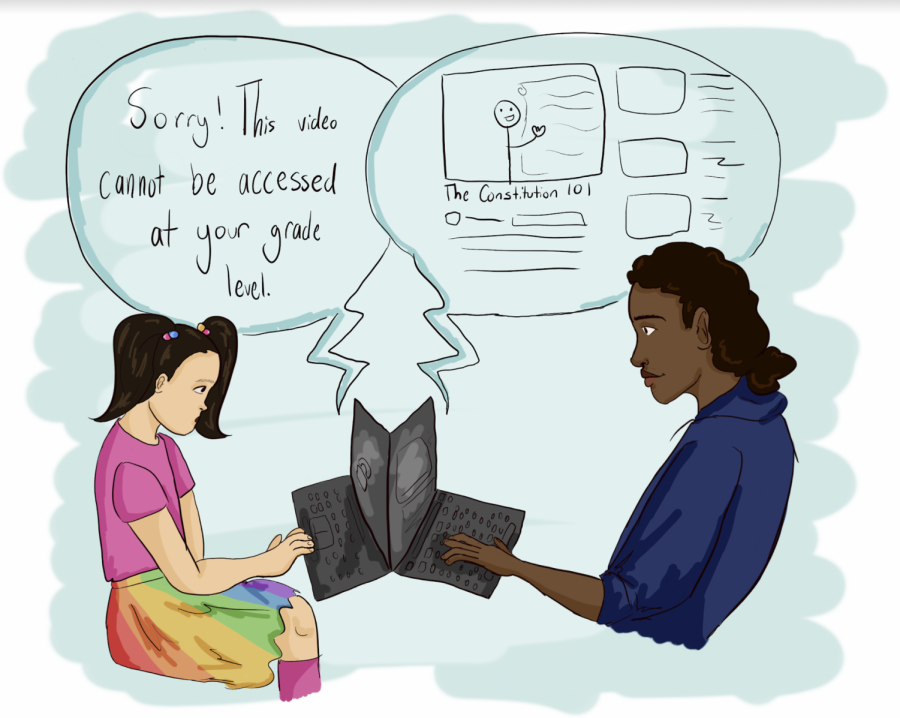New Securely filters enable SCUSD to foster online safety in grade-specific ways
Many students feel Securely filters hinder their experience, although the district’s intent is only to protect students.
When one-to-one Chromebooks were first introduced, a student may have opened their Chromebook and typed in a perfectly innocent phrase, only to receive a blocked Securely screen after searching. For SCUSD, this is a matter of protection, but for students, it can feel like a form of censorship.
Securely is a web-filtering program that schools use to protect students from potential harm on the internet, yet the system’s faults have led to a sense of miscommunication between the district and students.
Teacher on Special Assignment, Education Technology Michelle Brown said that towards the initial roll out of the one-to-one Chromebooks, Securely was difficult to navigate for everyone, with severe restrictions often popping up in appropriate searches.
“When we first got Securely, it was blocking ‘breast cancer’ because it was blocking ‘breast.’ And so then we had a conversation, you know, like, ‘That’s not our intention to block that,’” Brown said. “We encourage teachers, when they hear that things are getting blocked that shouldn’t be blocked, (to tell us). We can easily whitelist those things, make those allowable.”
On Feb. 23, the Securely filters changed, according to Director of Technology Joe Ayala. The previous filters were less customizable, with only a general filter that spans all grades from kindergarten to 12th grade and two extra filters surrounding YouTube access and specific searches. After the switch in February, the current system has four separate groups that Securely checks differently: PreK to second grade, third to fifth, sixth to eighth, and ninth to 12th. Ayala said the change was primarily to expand freedom while protecting users from potential harm.
“I want to secure the younger students, but not at the cost of the high school students,” Ayala said. “We call this a walled garden. We want to give you guys a space that you can learn and explore and research. It’s not that we want to limit the information.”
Despite the district’s efforts to maintain safety, many students still feel obstructed by the Securely filters.
“I personally find it difficult when I can’t research the proper topic on Google or YouTube because of restrictions, and that can be frustrating,” senior Angelina Valdivia said. “It (restrictions) hinders me from finding the information I need on the school device.”
Junior Clarence Caldo agrees.
“The restrictions I feel hinder our learning as students,” Caldo said. “In history class, many different sites we would be able to access online are restricted to us in the school Chromebooks.”
This is not the first time a district decision on internet safety has been met with confusion and concern among students. In January 2020, personal Google accounts were blocked on the school-issued Chromebooks, and many students felt this was a major inconvenience, subsequently choosing to use personal devices for school. Yet Brown explains the primary reasoning for the decision was student safety.
“Because we (SCUSD) gave you (students) the device, that is why we also gave you an account that can keep you safe. And then we have to say that account goes with that device,” Brown said. “We’ve been given money and a mission and part of the mission is to protect you.”
Although students feel hampered by Securely, Ayala notes that most of the administrators in the technology department are open to hearing from students directly about their issues with the monitoring software.
“I’m open to having a discussion about filtering, especially at the high school level, I really want to know what you guys are viewing,” Ayala said. “We want to work with the students. We want to work with the teachers. We want to work with administrators… if there’s a need to do something, we want to be able to work on that. And that’s the main reason why we did the upgrade is so we can have more of a freedom.”
With this new filtering system, Brown emphasizes that the precautions taken by the district are intended to protect students, not deny them the freedom to explore.
“Nobody in our district is trying to censor you,” Brown said.


